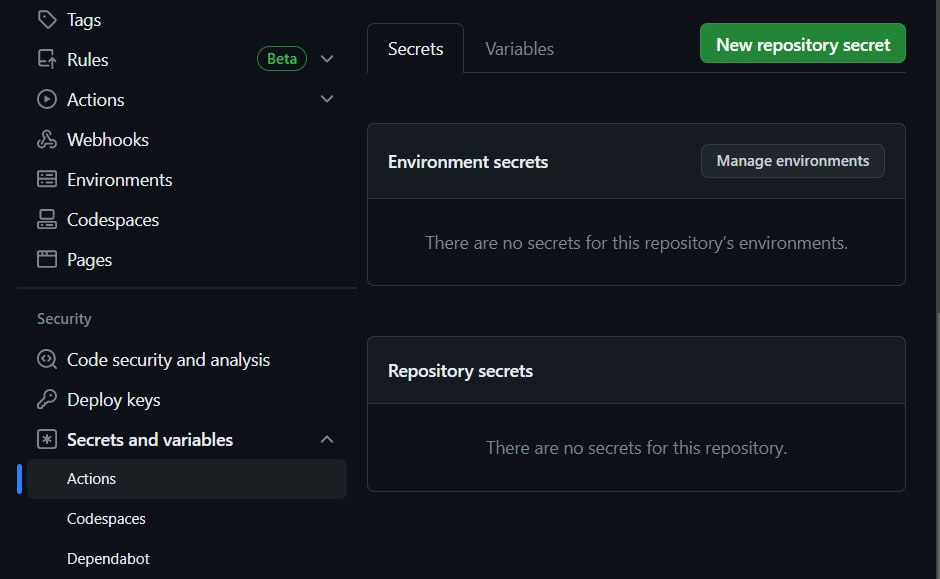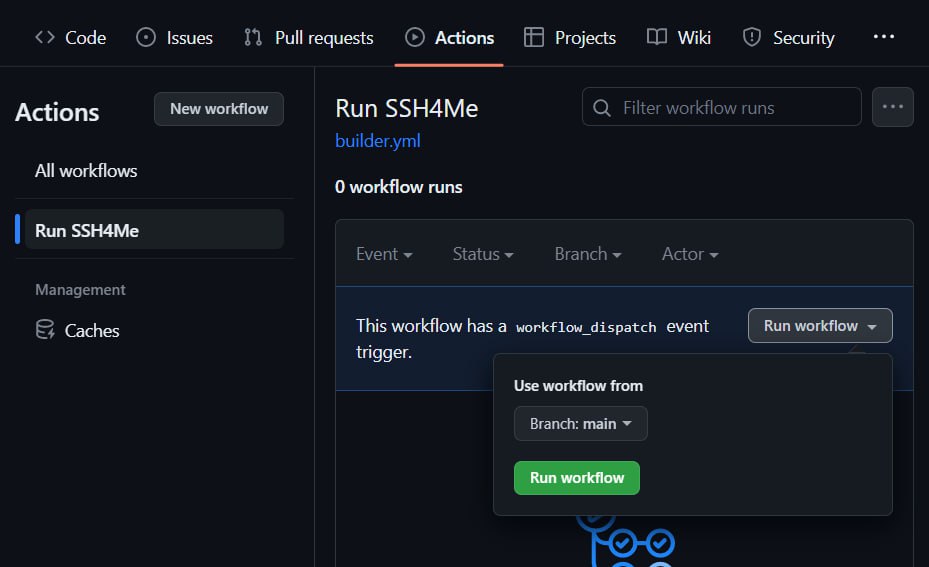https://github.com/jisan09/ssh4me
SSH4Me is a Docker container for secure root access to development environments via an Ngrok tunnel.
https://github.com/jisan09/ssh4me
docker dockerfile github-actions ngrok openssl railway railway-app ssh ssh-tunnel tunnel-server vps vps-server workflow workflows
Last synced: 3 months ago
JSON representation
SSH4Me is a Docker container for secure root access to development environments via an Ngrok tunnel.
- Host: GitHub
- URL: https://github.com/jisan09/ssh4me
- Owner: Jisan09
- Created: 2023-05-07T10:13:41.000Z (over 2 years ago)
- Default Branch: main
- Last Pushed: 2024-08-15T05:18:40.000Z (over 1 year ago)
- Last Synced: 2025-02-09T17:09:44.052Z (12 months ago)
- Topics: docker, dockerfile, github-actions, ngrok, openssl, railway, railway-app, ssh, ssh-tunnel, tunnel-server, vps, vps-server, workflow, workflows
- Language: Dockerfile
- Homepage:
- Size: 14.6 KB
- Stars: 21
- Watchers: 3
- Forks: 141
- Open Issues: 0
-
Metadata Files:
- Readme: README.md
Awesome Lists containing this project
README
# SSH4Me
SSH4Me is a Docker container that provides secure root access to development environments via an Ngrok tunnel. With configuration for root login and common development ports, SSH4Me makes it easy to access your environment securely from anywhere, including platforms like Railway.
## Requirements
To use SSH4Me, you will need:
- A GitHub account to fork the SSH4Me repository
- An ngrok account to get an authentication token
- Docker installed on your local machine if you want to run SSH4Me locally
## Installation and Setup
- ### Fork the SSH4Me Repository on GitHub
The first step is to fork the SSH4Me repository on GitHub. To do this click the "Fork" button in the top-right corner of the page.
- ### Sign up for an ngrok Account and Get Your Authentication Token
- Sign up for an ngrok account at [https://dashboard.ngrok.com/signup](https://dashboard.ngrok.com/signup).
- Get your ngrok authentication token from [https://dashboard.ngrok.com/get-started/your-authtoken](https://dashboard.ngrok.com/get-started/your-authtoken).

> **You will need this token when you build the Docker container on Railway or locally.**
〣 Run with Railway
- Go to [https://railway.app/new](https://railway.app/new) and build the Docker container with the following environment variables:
- `AUTH_TOKEN`: Your ngrok authentication token.
- `PASSWORD`: Password for SSH access (optional, default is `rootuser`).

〣 Run Locally
#### Install Docker
First, you need to install Docker on your local machine. You can download the appropriate version of Docker for your operating system from the [Docker website](https://www.docker.com/products/docker-desktop).
#### Clone the SSH4Me Repository
- Open a terminal window on your local machine.
- Clone the SSH4Me repository by running the following command:
```
git clone https://github.com/Jisan09/ssh4me
```
#### Build and Run the Docker Container
- Navigate to the `ssh4me` directory by running the following command:
```
cd ssh4me
```
- Build the Docker container by running the following command:
```
docker build -t ssh4me --build-arg AUTH_TOKEN=AUTH_TOKEN --build-arg PASSWORD=PASSWORD .
```
- Run the Docker container by running the following command:
```
docker run ssh4me
```
〣 Run with Github Workflow
NOTE :- This method isn't for making bot, it just for light work. This will work only for 6hr then will terminate.
- Create a new workflow file (`builder.yml`) inside `.github/workflows/` folder of your repository and copy paste the below conent. **Or you can just fork the SSH4Me Repository.**
```yml
name: 'Run SSH4Me'
on:
workflow_dispatch:
jobs:
build-and-run:
runs-on: ubuntu-latest
steps:
- name: Checkout repository
uses: actions/checkout@v2
- name: Run SSH4Me Action
uses: Jisan09/SSH4Me@main
env:
AUTH_TOKEN: ${{ secrets.AUTH_TOKEN }}
PASSWORD: ${{ secrets.PASSWORD }}
```
- Now go to the repository **`settings > secrets and variables > action > new repository secret`** and add the following environment variables:
- `AUTH_TOKEN`: Your ngrok authentication token.
- `PASSWORD`: Password for SSH access.

- Now go to **action** tab and run the workflow

> ***Wait for the build to complete. Once it's done, you should see your ssh & password in log.***
## Contributing
We welcome and encourage contributions to SSH4Me. If you find a bug or have an idea for a new feature, please open an issue or a pull request.
If you found SSH4Me useful, please consider giving it a star on GitHub by clicking the ⭐️ button. This helps to increase the visibility of the project and lets us know that you find it valuable.
Thank you for your support!